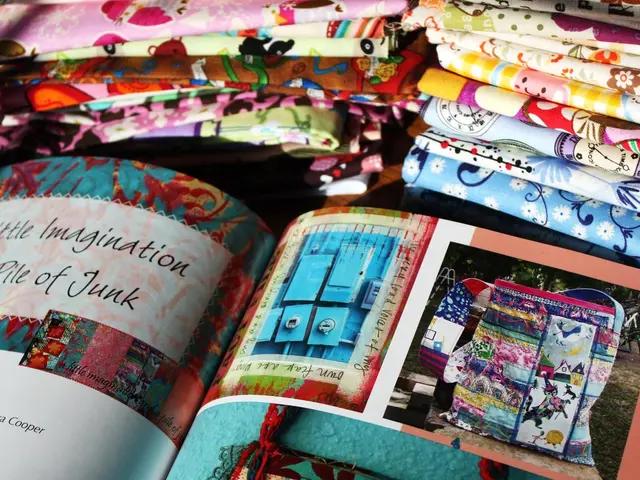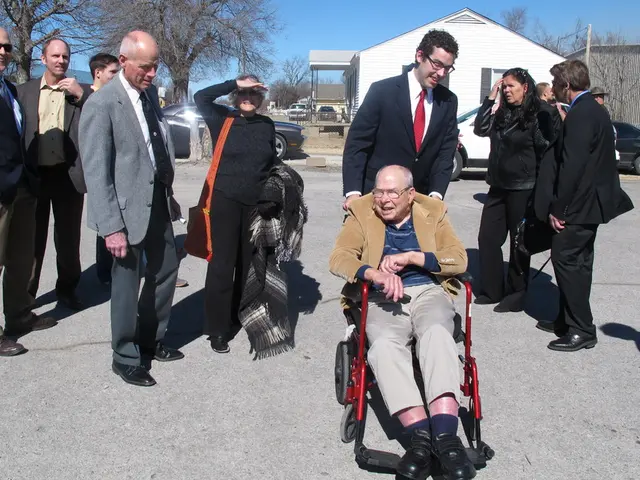Labeling Emotions is a Life Trick
In an initiative to shatter stereotypes and promote emotional honesty, podcaster Sebastian Tigges is launching his new podcast, aptly titled "Men Cry Secretly." This platform aims to foster conversations about feelings with notable figures. During a heart-to-heart conversation with the news agency spot on news, Tigges shared insights on the importance of male emotional expression, the dynamics of male friendships, and potential solutions to improve them.
Hesitant to Talk Feelings with Male Friends? Me, a Woman, Find This Mystifying. How Does That Work for You?
Sebastian Tigges: I've gone through therapy and been able to handle this a bit better. Historically, male friendships have functioned on an emotional level, albeit a shallow one compared to what depth can offer. Emotions like joy or anger have been the key connectors, but you don't really miss it if you don't know the taste of depth.
Envious of Women's Friendships?
Tigges: Yes, it feels desirable. But it's not about gender; it's about imprinting, education, and gender roles. Change is possible.
Mainstream Topic Yet Men's Behavior doesn't Adapt?
Tigges: It takes time for societal change to take root. Mainstream acceptance isn't equal to universal understanding. We see both progressive and regressive observations, especially on social media. It's not all consensus yet.
Bringing About Change?
Tigges: Through open discussions, listening, and reaching out to people. Hopefully, this will prompt one or two men to examine their lives.
Moments of Regret?
Tigges: Absolutely, particularly in my children's upbringing. I wish I hadn't been so entrenched in my imprinting.
Women's Role in Helping Men Emotionally Mature?
Tigges: It's not women's responsibility to ensure men grow emotionally. Men have to take responsibility for their own growth. Women can approach their partners with kindness if he's willing to work on himself.
Other Men's Role in Fostering Emotional Intelligence?
Tigges: In heterosexual male groups, I feel apprehensive, too - especially when alcohol is involved. These environments can be dangerous. However, there are also levels where it's harder to disengage from this culture.
A Real-life Example?
Tigges: When I worked as a lawyer, misogynistic remarks were common in the office. Instead of standing up for what's right, I simply avoided confrontation. But if you want to take responsibility, you have to speak out when it's uncomfortable.
Why Does it often take a Child for Men to Realize This?
Tigges: This question has crossed my mind often. The birth of my son was a turning point, pushing me to question my values and prompting me to seek change.
The Birth of Your Child the Aha-Moment You Realized Something Had to Change?
Tigges: It wasn't the birth, but the time afterward that was particularly impactful. I fell into a depression, and during that low point, I knew: This can't go on. I needed to adapt.
Depression Linked to Inability to Share Feelings?
Tigges: Yes, definitely. I felt everyone else could express themselves but me. If I had been better at verbally articulating my feelings, I might have navigated that time more effectively, perhaps even avoiding depression.
Did Your Male Friends Open Up After You Did?
Tigges: If my friends needed an emotional conversation, they'd turn to me because I'm open to it. On the one hand, I'm glad, but on the other, it's also a warning sign. These are sometimes men who don't feel comfortable opening up to their partners.
Biggest Insight from Lukas Klaschinski's Interview?
Tigges: What Lukas stands for is emotional awareness as a life-enhancing tool. Recognizing, naming, and experiencing emotions is preferable to unconsciously dwelling on them, minimizing them, or compensating with harmful behaviors.
- Sebastian Tigges, in his new podcast, "Men Cry Secretly," aims to discuss emotional honesty and foster conversations about feelings with notable figures, including topics such as science, health-and-wellness, mental health, and personal growth.
- Tigges shares insights on the importance of male emotional expression and the dynamics of male friendships, which he believes can be improved through education, self-development, and mindfulness in an effort to shatter stereotypes and promote change.
- When asked about women's role in helping men emotionally mature, Tigges emphasizes that it's men's responsibility to take charge of their own growth, while women can approach their partners with kindness if they are open to it.
- Tigges admits that he regretted not standing up for what's right in difficult situations, such as when he encountered misogynistic remarks in the workplace. He encourages men to speak out, even when it's uncomfortable, as a means to foster emotional intelligence and bring about change.








